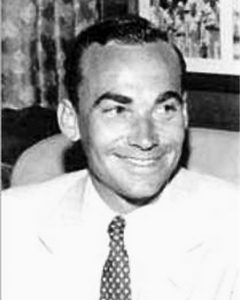
When WQAM Radio abruptly changed its format in 1980 to country music, it marked the end of a very long run as the broadcasting pioneer for Top 40 popular music in the industry.
Top 40 Radio was the brainchild of Todd Storz, the programming executive who built his idea around the concept of the juke box. Time Magazine described him as the “fastest rising figure in U.S. broadcasting.” He reasoned that teenagers and young adults put their coins in the slots to hear popular songs of the day — over and over again. He wanted his radio stations in St. Louis, Minneapolis, Oklahoma City, Kansas City, New Orleans and Miami to do the same. They would play only the top hits; ergo, Top 40.
And it worked for more than two decades. The disc jockeys who boomed out the pop music became household names and dominated the ratings. There was Charlie Murdock, Jim Dunlap, Lee Sherwood, Ted Clark, Roby Yonge and, of course, the legendary Rick Shaw.
When you tuned into 560 WQAM, you could count on hearing Elvis Presley, Pat Boone, Fats Domino, Chuck Barry and the Everly Brothers; and in the 60’s, when the Beatles dominated popular music, the station held a contest and sent their winners on a chartered plane to Jacksonville where Shaw interviewed the Fab Four.
During the 1970s when the Bee Gees were the rage, it was not uncommon for Barry Gibb and his brothers to drive their sleek speedboat up the inland waterway on Miami Beach, stop outside the WQAM studios, beep the horn and flash broad smiles for the employees.
But the advent of FM radio stations playing popular music finally knocked WQAM off its pinnacle. By 1980 they were getting drubbed in the ratings by other rock stations, so a drastic change was called for.
At 3 p.m. March 3, 1980 the station began playing a pre-taped music and documentary program which paid homage to its history and then announced the sudden change of format. WQAM would now be known as Sun Country, and the music of Merle Haggard, Barbara Mandrell, Johnny Cash, Loretta Lynn and Conway Twitty would be played.
Johnny Dolan, one of the disc jockeys not in on the switchover, turned in his resignation. WQAM’s switchboard was flooded with calls criticizing the change. I called advertisers such as McDonalds and Publix notifying them of the format change. Their contracts contained cancellation clauses in case of a programming change. Fortunately for us, they did not stop their advertising.
As things settled down around 7 p.m., three of us, program director Dan Halyburton, account executive Ed Perl and myself (sales manager) decided that some planning — and drinking — would be next on the agenda.
We picked the Taurus in Coconut Grove, a popular watering hole, for our rendezvous. Shortly after arriving, Dan – who was used to dramatic situations – thought some entertainment should be the order of the day. Ed commandeered the microphone in Taurus’ main lounge and brought the crowd up-to-date on the music change at WQAM. He introduced me and then brought up Dan as the man “who was going to make it all happen at WQAM.”
Halyburton preceded to give the crowd a quick tutorial on country music. Then it was time to close his part in the program, so Dan chose a poem he thought would make an appropriate caption to the day’s frenzied activity:
“Rutabaga, rutabaga
Rutabaga spit
If you ain’t country
You ain’t s__t”

About the Author
Bob Goldstein is a retired broadcaster and advertising executive who has lived in South Florida for more than forty years. He is a veteran political activist (dsdcfl.org) and a member of the South Florida Writers Association. If you would like to comment on Bob’s columns, send your response by email to robertgrimm62@yahoo.com.






